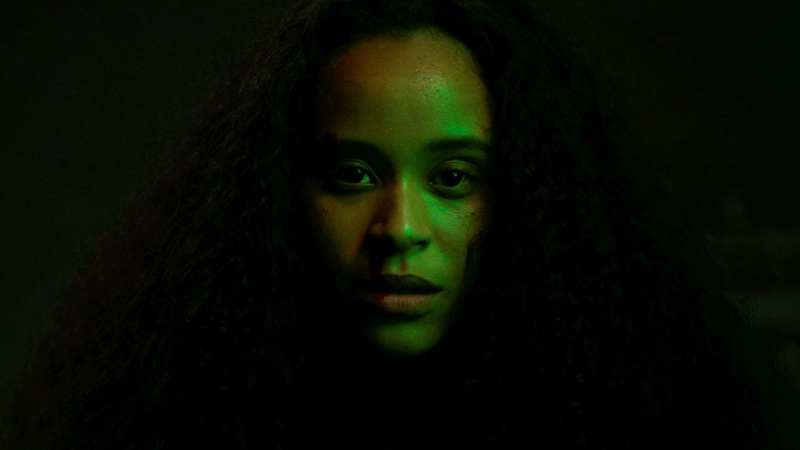Director – Anita Rocha de Silveira – 2021 – Brazil – Cert. 15 – 127m
***
Pro-purity, fundamentalist, Christian church girl band singer indoors by day; slut-shaming, Evangelical, vigilante group member outdoors by night… a woman is haunted by a facially disfigured figure from the past – out in UK cinemas also available on PVOD and ESVOD on Friday, July 14th, and to rent on BFI Player from Friday, July 21st
Night. An exotic dancer, bent over backwards so both hands and feet touch the floor. Writhing.
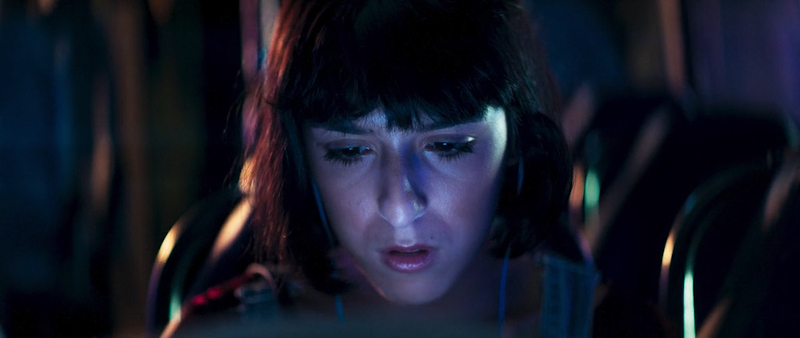
A young woman, watching this on her smartphone on the bus at night. She reaches her stop, gets off and starts walking. A gang of white masked, female vigilantes on the prowl, suddenly, behind her. She walks faster, they catch her, surround her, slut-shame her, call her a homewrecker, threaten her into “serving the Lord”. Afterwards, the female vigilantes walk off in a line across the road. On the wall, posters depicting a fist and a snake.
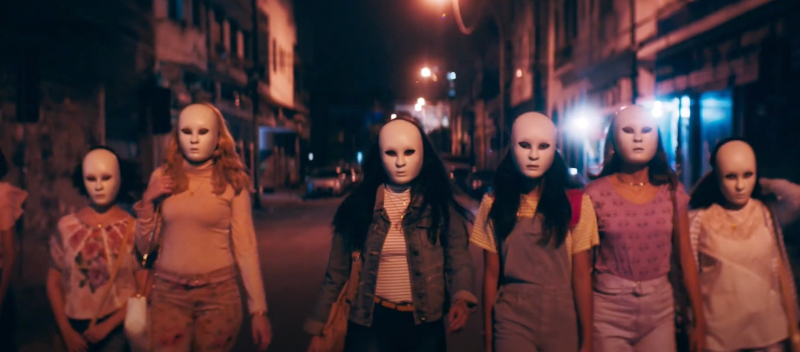
To better herself, another young woman Clarissa (Bruna G.) is taken our of an ordinary school and sent by her aunt to an up-market, fundamentalist, evangelical Christian church school where she’s quite nervous about fitting in: but Clarissa needn’t worry – she’s soon befriended by Mariana aka Mari (Mariana Oliveira) who takes the newcomer under her wing. Mari and her friend Michele (Lara Tremouroux) both perform in the church’s girl band Michele and the Treasures delivering songs about Christian platitudes and sentiments to a large congregation as accompaniment to the fervent purity and religious conversation-oriented preaching of Pastor Guilherme (Thiago Fragoso). Michele also does a nice line in religious podcasts, and notes that their uploaded video of the religious beating received over 1 000 likes.
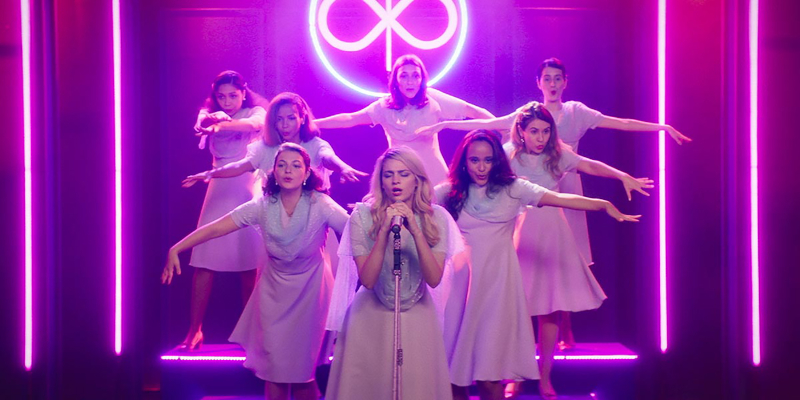
At night, to fit in with her peer group, Clarissa finds herself going out from the school on slut hunts with the female vigilantes, of which Mari and Michele are part. The boys at the school, fit and muscular to a man, form a similar vigilante group, operating separately from the female vigilantes and targeting sexually active couples rather than lone women. The boys and girls are encouraged to meet and talk in a chaperoned school session for five minutes – which a possible future marriage in mind – and one of them, Jonathan (João Oliveira), becomes Mari’s fiancé.
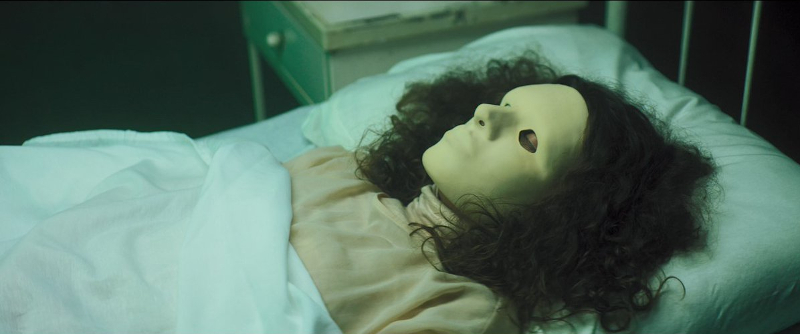
Mariana is haunted by the story of Melissa (Bruna Linzmeyer), a woman who danced, drank and spent time with a different man every night twenty years ago until confronted by a religious vigilante who set Melissa’s face on fire, causing her to retreat from public society (not unlike that classic horror icon the Phantom Of The Opera, a presence echoed here in the vigilantes’ masks).

However, when Mari receives a cut to her facial cheek from a woman defending herself against Mari and the others’ vigilante attack, she starts to doubt the ethos of both the church and its vigilante activity. When her minor facial disfigurement unsettles the patients at the plastic surgery clinic where she works, she is sacked from her job, finding alternative employment in a care home where she’s initially shocked and disgusted by having to physically care for comatose patients, e.g. rubbing ointment all over them to prevent chafing and bedsores. Also, she finds herself physically attracted to one of the male nursing staff members…

While writer-director de Silveira paints her story in board brushstrokes and includes a great deal of detail, it’s not always clear how much of this fits into the larger picture, which makes for an infuriating watching experience, although the overall drift of the piece as a diatribe in favour of sexual liberation and against its repression for reasons of religion is clear enough. The film looks very good thanks to stylish lighting by João Atala, but the finer points of the storytelling are all over the place.
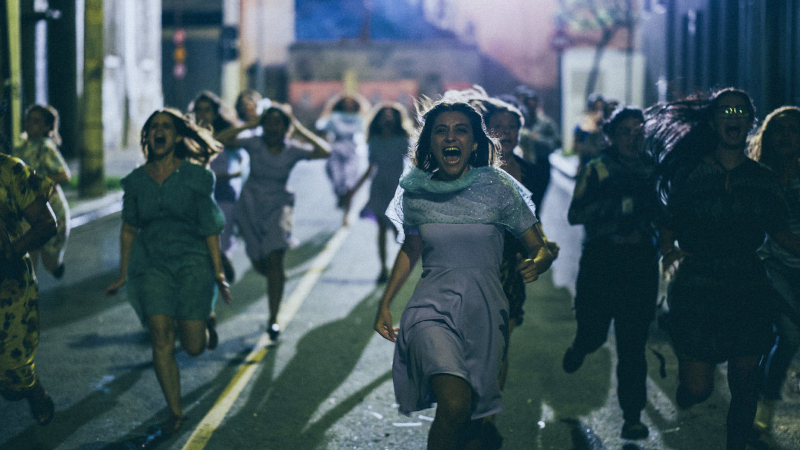
Promising elements are introduced then dropped before the film has a chance to develop or explore them in any depth. You sense that the writer-director has been on the receiving and of anti-promiscuous Christian fervour – one vigilante victim makes a passionate and heartfelt diatribe in favour of a promiscuous lifestyle – but lacks understanding of the mindset inside a religious community or group, painting its repressive, religious, evangelical types here as caricatures rather than the more convincing flesh and blood portrayals in You Can Live Forever (Mark Slutsky, Sarah Watts, 2022) and the superior Apostasy (Dan Kokotajlo, 2017), as it happens, both films about Jehovah’s Witnesses. The current film may be exploring a very different and much more Latin and passionate, fundamentalist Christian tradition, and articulating a strongly heartfelt response to it, but it feels like a film made by an outsider to all that rather than an insider.
Medusa is out in cinemas in the UK also available on PVOD and ESVOD on Friday, July 14th, and to rent on BFI Player from Friday, July 21st.
Trailer:
